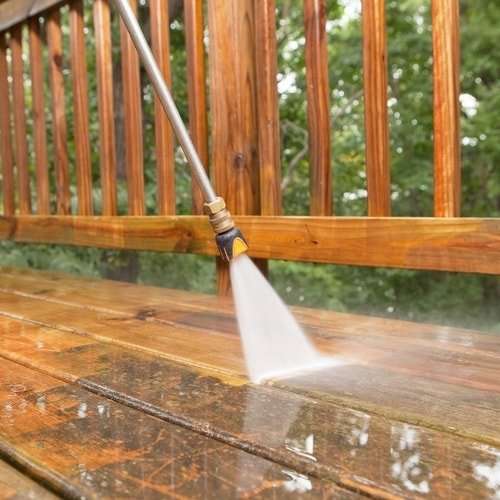Can You Pressure Wash in the Winter? To an extent, yes. It\’s generally not advisable to power wash when the outside temperature is below 40 degrees. Cold temperatures can damage pumps, cause water to freeze as it’s sprayed onto your home, and increase the risk of hypothermia for workers. It also makes for less effective cleaning. Consequently, power washing in most northern climates is a no-go from December through March. However, in warmer climates that rarely drop below 40 degrees, like Texas and Florida, power washing can be done year-round without issue.
When temperatures drop to 32 degrees Fahrenheit, the freezing point for water, the job becomes trickier. On calm days, standard techniques can be used even if the temperature dips to 15 degrees, but windy conditions require temperatures to be above 35 degrees to account for wind chill. Additionally, clients should be cautious of icy surfaces as cleaned areas can freeze quickly in cold weather. To mitigate this, applying rock salt or another ice melt can enhance safety.
If you’re wondering about the feasibility of pressure washing during winter, McCoy\’s Deck Staining and Pressure Washing offers practical winter pressure washing tips and ensures safe, effective services in Brentwood, Murfreesboro, Nashville, and surrounding inside Tennessee even in colder weather. Contact us to learn more about our winter cleaning services.
What is Pressure Washing?
Pressure washing is a high-powered cleaning method that employs pressurized water to remove dirt, grime, mold, and other contaminants from surfaces. This technique is particularly effective for outdoor areas like driveways, sidewalks, decks, and siding.
Like most cleaning methods, pressure washing relies on water to clean surfaces, though it has the bonus of pressure that can blast away even the most stubborn filth. The powerful stream of water effectively blasts away accumulated debris, leaving surfaces looking revitalized and enhancing your property\’s look.
Why Is Pressure Washing Important in Winter?
During the winter months, the accumulation of dirt, salt, and grime is inevitable due to snow, sleet, and freezing temperatures. Also, as the exterior surfaces accumulate those elements throughout the year, winter weather aggravates this issue. Cold temperatures, rain, snow, and ice chunks can create a stubborn layer of dirt that is difficult to remove.
In such conditions, winter pressure washing becomes crucial. Using the high-pressure water spray, you can effectively strip away the accumulated dirt and grime, restoring the surfaces to their original condition. It can prevent long-term damage caused by dirt buildup, enhancing the aesthetic appeal of your property.
Additionally, pressure washing in winter helps prepare surfaces for necessary maintenance or repainting. It ensures your property remains well-maintained despite the season\’s challenges. That being said, it is equally essential to adopt safety measures, do\’s and don\’ts, especially in winter.
The Do’s and Don’ts of Winter Pressure Washing
Winter pressure washing presents unique challenges that require specific precautions to ensure both safety and effectiveness. From dealing with freezing temperatures to managing ice and snow, there are several do’s and don’ts to keep in mind when pressure washing during the colder months. Let\’s explore these guidelines to help you achieve the best results while maintaining safety.
Do: Use Hot Water
When pressure washing in cold temperatures, the main risk arises with freezing pipes and surfaces. So, it\’s better to use hot water. Warm water aids in dissolving stubborn grime and ice and accelerates the cleaning process. A temperature between 180 and 200 degrees Fahrenheit can be optimal so that the evaporation rate will minimize the risk of icing.
Do: Pressure Wash Out in the Sun
Sunny days in winter can be the perfect time to pressure wash outdoor surfaces. The sun\’s warmth helps prevent freezing pipes and surfaces during washing, making the process easier and more efficient. It is even better to do this in the afternoon when the weather is likely at its hottest. The sun also speeds up the drying process, preventing ice from crystallizing and making cleaning more effective.
Don\’t: Forget to Protect Yourself
Pressure washing in winter is a challenging job. Since you must deal with chilly weather conditions, protecting yourself should be your priority. Hypothermia can be a real problem, especially in areas with sub-freezing temperatures. To prevent this, make sure to dress appropriately. Wear protective gear such as goggles, gloves, and hats. Similarly, you can wear rubber boots or spiked footwear. In doing so, you can avoid slipping on wet or icy surfaces when pressure washing outside.
Do: De-ice
When pressure washing in winter, ensure the surface you\’re cleaning is ice-free. Ice can obstruct the cleaning process and damage the pressure washer\’s components. Use a safe and effective ice-melting solution to clear the area. Better de-ice your surfaces before you start pressure washing to ensure everyone\’s safety. You can apply salt, sand, calcium chloride, or magnesium chloride to the surface area.
Don\’t: Forget to Check Your Fittings
Before you start pressure washing, make sure to check all fittings and connections on your pressure washer. Cold temperatures can cause fittings to contract and loosen, leading to leaks or malfunctions. Ensuring everything is secure and in good working condition will help prevent any mishaps during the cleaning process.
Don\’t: Forget to Account for Chemical Imbalances
Another prominent factor while pressure washing in winter is utilizing the cleaning chemicals safely. Protect the cleaning chemicals from cold temperatures, as chemicals don\’t tend to work as well in the winter as they do during other times of the year. When using a liquid chemical, remember that they can separate if you allow them to freeze. Store them in a warm and dry part of the house to avoid this.
Do: Protect Your Pressure Washing Machine
Taking care of machines is equally necessary, especially in winter weather. Store your pressure washer in a warm and dry place when not in use. Leaving it outdoors may lead to freezing in the machine\’s pump, which will cause it to expand and even burst. Proper storage protects the fittings and lines, saving you money and trouble.
By following these do’s and don’ts, you can effectively and safely pressure wash during winter, ensuring that both your equipment and surfaces remain in good condition.
What Months Are Best To Pressure Wash?
Experts agree that the best time to pressure wash your house is during the spring or fall, avoiding extreme temperatures that can hinder the cleaning process. The ideal period for pressure washing is between March and November when the weather is neither too hot nor too cold. Spring, in particular, offers milder temperatures that facilitate effective cleaning without the risk of freezing water on surfaces.
However, if you must pressure wash during winter, ensure the temperature is above 40 degrees to avoid damaging your equipment, risking your safety, and freezing the surfaces. If winter cleaning is unavoidable, wait until the afternoon when temperatures are slightly higher.
How Often You Need to Pressure Washing in Winter?
The frequency of pressure washing your home in winter largely depends on the climate and environmental conditions where you live. Winter can be harsh on different parts of the home, with changing temperatures, ice, and snow impacting various building materials. If you live in a region with cold, harsh winters, it is advisable to pressure wash your home twice a year: once before winter to prepare your home and once after winter to refresh it after months of bad weather. Washing in the fall and spring increases the likelihood of having a sunny, mild day, making the process more effective.
In warmer climates, you may not need to pressure wash as often. However, homes in these areas can be more susceptible to mildew and mold due to higher humidity levels. In such cases, pressure washing once a year may be sufficient, provided that it is timed to avoid regular rainfall or storms. Regular rain and wind can cause debris buildup, making it essential to maintain your home\’s cleanliness and appearance through periodic pressure washing.
Suitable Cleaning Agents for Winter Pressure Washing
Now that you understand the various pressure washing techniques and their importance, let\’s explore the suitable cleaning agents for winter pressure washing. Using the right chemicals can make a significant difference in the effectiveness of your cleaning efforts during the colder months.
Effective Liquid Chemicals for Colder Temperatures
When pressure washing in winter, it\’s essential to choose cleaning agents that are formulated for cold weather applications. Enviro Bio Cleaner (EBC) is an excellent option as it is a water-based, biodegradable degreasing agent that performs well in low temperatures. Another effective choice is the F9 Calcium And Efflorescence Remover, which reduces fuming and corrosion while providing powerful cleaning action on concrete and masonry surfaces.
Aluminum Brightening Solutions for Brake Drums
For areas with stubborn brake dust and dirt, consider using aluminum brightening solutions like the CPS Liquid Gold Hard Surface Cleaner Degreaser. This product effectively breaks down brake dust and restores shine to aluminum surfaces, making it ideal for cleaning brake drums and other metal parts.
Using Magnesium Chloride on Outdoor Water Sources
To prevent freezing in outdoor water sources, treat these areas with magnesium chloride. This chemical helps keep surfaces ice-free, facilitating pressure-washing endeavors during winter. It\’s particularly useful for preparing areas before pressure washing to ensure a smooth and efficient cleaning process.
Undercarriage Cleaners and Acid Cleaning Solutions
When cleaning vehicles or outdoor equipment in winter, undercarriage cleaners and acid solutions are essential for removing road salt and grime. The F9 Double Eagle Cleaner, Degreaser, Neutralizer is a versatile product that can tackle various contaminants on concrete, bricks, pavers, and more. Additionally, ShoreBest 2377 Concrete & Efflo Cleaner is a high-concentrate blend that effectively removes concrete, mortar, and grout deposits, making it ideal for winter cleaning tasks.
FAQs
At what temperature is it OK to pressure wash outside?
It is better to choose a temperature between 50 and 80 degrees Fahrenheit. Keep in mind that more warm and cold climates affect the cleaning process.
Reach McCoy\’s Deck Staining and Pressure Washing for the best pressure cleaning services within the nearby locations.
What can I put in my pressure washer to keep it from freezing?
Utilize specialized cold-weather additives to prevent the freezing of your pressure washer. Incorporating a stabilizer into your gas will be best to prevent it from becoming stale. Similarly, using a \”pump saver\” in your water pump protects against freezing.
Does pressure washing slow down in the winter?
Pressure washing indeed slows down in the winter. Below a certain temperature, it doesn\’t work as well. That means heat is the key element needed during the pressure washing process. Effective pressure washing will happen with enough heat and direct sunlight.
How cold is too cold to wash?
It is better to skip the schedule if the temperature is below 32 degrees Fahrenheit. Low temperatures bring more challenges, affecting the pressure washing process and you too.
How long can you continuously run a gas-pressure washer?
It would be best to leave a gas-pressure washer for only a short time. Doing so will increase the risk of overheating and might aid in further damage.
Is it better to pressure wash with or without soap?
It depends on what you\’re cleaning. It is not necessary, but you can add soap or detergent when pressure washing your house. However, ensure that the soap is suitable for cold weather applications.

